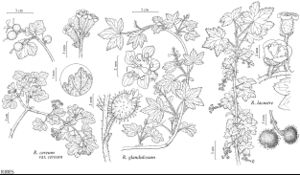Ribes cereum
Trans. Hort. Soc. London 7: 512. 1830,.
Plants 0.2–2 m. Stems spreading or arching to erect, puberulent, sparsely to copiously stipitate-glandular; spines at nodes absent; prickles on internodes absent. Leaves: petiole (0.3–) 0.6–1.2(–2.8) cm, glabrous or finely to copiously pubescent; blade almost reniform to broadly cuneate-flabellate, 3–5(–7)-lobed, shallowly cleft, (0.5–) 1–2(–4) cm, base cordate to truncate, surfaces glabrous or copiously pubescent, sparsely stipitate-glandular to downy to conspicuously stipitate-glandular and sessile-glandular, particularly noticeable on margins, lobes rounded, margins coarsely crenate-dentate, apex obtuse. Inflorescences pendent, solitary flowers or 2–8(–9)-flowered racemes, 1–3 cm, axis finely pubescent, ± sticky with short-stalked to subsessile glands, flowers tightly clustered at end of peduncle. Pedicels jointed, (0.4–)1–2.2(–3.4) mm, puberulent; bracts flabellate or ovate to obovate, 3–7(–8.8) mm, pubescent, stipitate-glandular. Flowers: hypanthium white to greenish white with pink tinge, or pinkish white, narrowly tubular, tube widest at base and near throat, 5–9(–9.4) mm, densely hairy and scattered stipitate-glandular abaxially, glabrous adaxially; sepals not overlapping, spreading-recurved, greenish white to white or faintly to strongly pinkish tinged, deltate-ovate, 1–3.2 mm; petals connivent, erect, white to pink, orbiculate or flabellate, not conspicuously revolute or inrolled, 1–2.1 mm; nectary disc not prominent; stamens shorter than petals, (inserted below petals and completely included in hypanthium tube); filaments linear, 0.5–1.6 mm, glabrous; anthers pale cream-yellow to yellow, oval, 0.6–1.2 mm, apex with small, cup-shaped gland; ovary glabrous or hairy or sparsely to densely pubescent; styles connate nearly to stigmas, 7.5–11.5 mm, proximally hairy or glabrous. Berries tasteless, dull to bright red or orange-red, ovoid, 5–12 mm, sparsely glandular to glandular. 2n = 16.
Distribution

Alta., B.C., Ariz., Calif., Colo., Idaho, Mont., N.Dak., N.Mex., Nebr., Nev., Okla., Oreg., S.Dak., Utah, Wash., Wyo.
Discussion
Varieties 2 (2 in the flora).
Ribes cereum has a notably spicy odor. The bright green style, which becomes brown with age, is striking.
Selected References
None.
Lower Taxa
Key
| 1 | Bracts truncate to broadly rounded apically; sepals pubescent and stipitate-glandular. | Ribes cereum var. cereum |
| 1 | Bracts acute apically; sepals glabrous or sparsely to densely pubescent, not stipitate-glandular. | Ribes cereum var. colubrinum |
